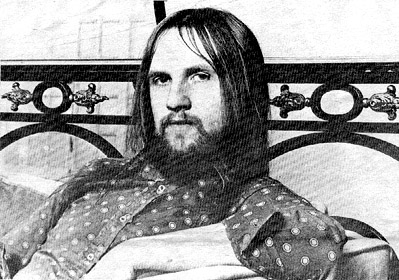
Procol HarumBeyond |
|
|
PH on stage | PH on record | PH in print | BtP features | What's new | Interact with BtP | For sale | Site search | Home |
|
Mick Grabham, Procol Harum's guitarist ever since he replaced big Dave Ball almost a year ago, lives in a tastefully-furnished Harrow semi with his wife, the two dogs and a street full of neighbours who are about as far removed from the rock and roll business as you could imagine.

It all mirrors the fact that Mick is a pretty quiet bloke and got himself a nice reputation through nothing much other than playing excellent electric guitar rather than being one of the blue-eyed boys of the pop industry.
To date Mick has only played with three bands, including Procol, the first being when he became a latter-day member of Plastic Penny in 1968 before splitting after a month or so to co-found Cochise. The Plastic Penny gig, he says, was disastrous on a musical level, though their couple of chart entries during 1967 / 68 meant that they were a reasonable draw during this time.
"On some of the very first Cochise gigs," Mick recalled with a smile, "We even used Plastic Penny's name for its drawing power – such as it was. Plastic Penny failed because there was just no music to bring out and its weaknesses far outweighed its strength, whereas Cochise had the right ideas in the first place and there was a clear direction: but as time went on that got more and more obscured. That's why Cochise folded – nobody knew where to turn next."
Mick's playing days began in Sunderland, his home town, with the usual string of semi-pro groups just before the craze for electric Blues bands happened in 1966. His playing now still has its roots sunk deep in the Blues though the range of music that he listens to in the house is vast.
Obviously the best insight into exactly where Mr Graham's [sic] head is at should have been gleaned from the solo album released last year as part of the Cochise contract, but Mick is somehow shy of discussion over the album:
"The first time I thought I'd like to do a solo album was when I heard the first Emmitt Rhodes album which I thought was really great. I just asked the record company if I could do one and they said sure. I think it was about a year in the making, off and on, and I think it turned out reasonably well though I can see a lot of things wrong with it now."
Helping on the sessions were Mick's old mates from Sunderland, Nigel Olsson, Caleb Quaye and the Hookfoot rhythm section and horn player Dick Parry. Mick reckons that if any good did come out of his solo effort it was that it helped him get a lot of things out of his system which had previously been looking for a release: "Only about a quarter of the songs were my own and I think I couldn've [sic] chosen better songs than I did to make up the rest of the album."
Mick eventually left Cochise to start up some kind of guitar-based orchestra with the out-of-work Ray Fenwick. The project however never actually reached reality for in the midst of tentative rehearsals came the call from Procol: "I got this call from Chrysalis asking me if I'd like to go and jam with the band. I'd always dug Procol and I'd listened to all the albums so I knew what they were looking for when I went along.
"The thing is though, after a year playing with them hasn't changed my playing at all, though I think a lot of people think that Procol tend to mould musicians to suit the group."
A month's solid rehearsal at the Rainbow preceded Mick's début appearance with Procol and the London Symphony Orchestra in London last autumn: "Naturally I was a bit nervous about that first gig because it was the first time I'd ever been near a full orchestra and to try and fit in with them was a challenge."
Since then Mick has completed a three-month US tour as well as the two-week British tour earlier this year. That tour plus the release of Grand Hotel, Mick estimates, has restored Procol in the reckoning of British rock fans and has narrowed the gap between the band's American and British following.
Most of the guitar parts for Grand Hotel had been laid down by Dave Ball from the split [sic] but on Mick's joining it was decided to re-record them. "Recording with Procol," says Mick, "is surprisingly easy. It's a very easy-going kind of approach and it's much more of a group effort than a lot of people think.
"Gary (Brooker) doesn't dominate everything in sight. Obviously he has to have a lot of say because the songs, or most of them, are written by him and Keith Reid but when it comes to working out arrangements everybody comes up with ideas."
Mick's integration, guitar-wise, with Brooker's very much up-front piano-playing and with Chris Copping's all-embracing organ-playing, has been carried off smoothly. "Gary is a rocker at heart, and when somebody has that in them I have no trouble fitting in with them. He's a really brilliant pianist but he leaves a lot of spaces to be filled in."
"Chris, too, is never pushy because he follows the band rather than leading them, but what he does play is really important just for moods and different feels."
(Thanks, Phil Skerratt, for lending your Procol scrapbook to BtP)
|
|
|
|
|
|
|
PH on stage | PH on record | PH in print | BtP features | What's new | Interact with BtP | For sale | Site search | Home |
|